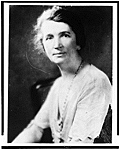Posted on July 15, 2009
Ginsburg Howls
Madam Justice's inhumanity slips
by
Daniel Clark
Before any Republican senators agree to confirm another liberal Supreme Court nominee, they might pause to consider some recent remarks by Justice Ruth Bader Ginsburg. In a July 12th interview with New York Times Magazine, the Clinton appointee reflected on two decisions that had been handed down prior to her ascension to the Court: the Roe v. Wade ruling that legalized abortion on demand, and Harris v. McRae, which upheld the Hyde Amendment, a prohibition on the use of Medicaid funds for abortion.

"Frankly I had thought at the time that Roe was decided, there was concern about population growth and particularly growth in populations that we don't want to have too many of," she explained. "… But when the Court decided McRae, the case came out the other way. And then I realized that my perception of it had been altogether wrong." A true activist judge, she had presumed that the role of the federal judiciary was to implement a consistent policy agenda.
Ginsburg's admission of the pro-abortion movement's eugenic motives did not escape everyone's notice the way it did that of the Times interviewer. Some conservatives have begun comparing the justice to Planned Parenthood's eccentric founder Margaret Sanger, who sought to suppress the populations of those she described as "human weeds."

Sanger, who once wrote, "The most merciful thing that a large family does to one of its infant members is to kill it," was an unabashed racist who proposed the sterilization of "genetically inferior races," and the rounding up of physically and mentally handicapped people into labor camps. Surely, it's unfair to compare Justice Ginsburg to anybody who believed things like that. Good liberals like Ginsburg may advocate the dismemberment and killing of the most innocent people in existence, but at least we can always count on them to oppose bigotry, right? Well, what on earth did she mean, then?
One might suppose that she was using the word "we" facetiously, in such a way that it did not include herself, much like Oscar Madison did in explaining to his poker buddies the importance of using a coaster ("and we don't want little rings on the table"). This would indicate her disapproval of Planned Parenthood's motives, and her relief that they were foiled by the subsequent decision upholding the Hyde Amendment.
There's one problem with that explanation, though, which is that Ginsburg herself is an outspoken advocate of the use of Medicaid to pay for abortions. This places her firmly on the same side as the "we" she speaks of in both Supreme Court cases. During the same interview, she lamented that if Roe were repealed, only women with the means to travel to abortion-friendly states could exercise their "choice." One must wonder, in the context of her other remarks, whether she was really more concerned about the so-called "reproductive rights" of impoverished women, or about the fact that a higher percentage of undesirables would manage to escape the womb.
The Planned Parenthood slogan, "Every Child a Wanted Child," is chilling enough when you consider the fate of the unwanted ones. It becomes positively horrifying once you ask yourself the question, wanted by whom? If those words merely meant that children should have parents who want them, then the organization's primary role would be to arrange adoptions. This, of course, would defeat Sanger's whole purpose, by simply transplanting the human weeds that she wanted to have stamped out altogether.

What Planned Parenthood means by a "wanted child" is a child who is wanted by the megalomaniacs like themselves, who presume to dictate who is or is not worthy of existence. That is to say, one who is wanted by the people that Justice Ginsburg addresses as "we."
It wasn't by chance that the first modern nation to legalize abortion was the Soviet Union, or that the rise of the American pro-abortion movement coincided with the construction of LBJ's Great Society. For all of the rhetoric about empowering women, legalizing abortion has always been about empowering the left-wing social engineers. For all the lip service its advocates pay to individual freedom, abortion has always been the ultimate sacrifice of the individual to the collective.
It's not surprising that Ginsburg, a former ACLU counsel, would at least partially endorse Sanger's ghastly philosophy, but the fact that the Senate confirmed her nomination by a vote of 96-3 ought to have been a scandal. For she's the kind of Supreme Court justice that we don't want to have too many of.
-- Daniel Clark is a Staff Writer for the New Media Alliance. The New Media Alliance is a non-profit (501c3) national coalition of writers, journalists and grass-roots media outlets.
The Shinbone: The Frontier of the Free Press
Mailbag . Issue Index . Politimals